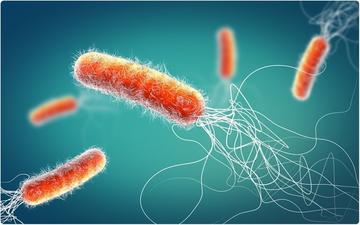
Pseudomonas aeruginosa, the bacterium used in the study
New research from the University of Oxford’s Department of Biology, and published today in Proceedings of the National Academy of Sciences (PNAS), has shown how evolution can favour cooperation in wild bacteria.
Cooperation means working together on a shared project. We all cooperate with others on a daily basis. Lots of other organisms also cooperate. Elephants help to raise calves, birds look for food together, fish act as shoals to confuse predators. Bacteria also cooperate. One of the ways they do this is by releasing molecules, which provide benefits to others cells such as harvesting iron from their surroundings. Because these molecules are good for all bacteria in a population, they’re known as ‘public goods’.
Experiments with bacteria in laboratories, and supported by mathematical modelling, suggest that evolution can favour the production of public goods when the benefits are seen by closely-related bacteria. This is known as kin selection.
But do bacteria cooperate in the wild?
“It’s hard to measure if bacteria are actually cooperating because we can’t observe their behaviour in the same way we do with animals. Instead, we investigated DNA sequences from wild bacteria to look for signatures of selection”
Laurie Belcher, first author on the study
The researchers looked at the genome sequences of a common species of bacteria, Pseudomonas aeruginosa, taken from soils, lakes, rivers, and the ocean. When a gene for public goods is evolving because of kin selection, it produces a particular pattern. Using computational techniques, the researchers searched for this pattern in the DNA data. They used samples from a broad range of environments, and data from lab-based studies helped them zero in on the potential cooperation genes.
They found that cooperation genes had the predicted pattern. They tended to be more different from the genes they evolved from (high divergence) and also harboured more genetic variation (polymorphism). This is strong evidence that kin selection favours the evolution of public goods cooperation in wild bacteria.
“Even more unexpected, we found the exact same pattern when we repeated the analyses on clinical strains [from human infections]. This shows that cooperation is important for the way bacteria causes disease.”
Laurie Belcher
It wasn’t all plain sailing though. To make sure that the researchers had a robust argument, they devised a series of checks and balances for their data and analyses. For example, pieces of DNA called ‘mutator elements’ can make genomes seem like they’re changing faster than expected, or genes with different expression levels can be affected differently by selection. These can mess up the results, so it was important to go through and control for these effects
What’s next?
“We’ve shown that this detective method of finding signatures of selection can work by using wild bacterial genome sequences. This could be expanded to different species of bacteria, different pathogens, and different things that bacteria do. It could even be used to help treat infections using bacteria cooperation”
Laurie Belcher
To read more about this research, published in PNAS, please visit: https://www.pnas.org/content/119/9/e2119070119